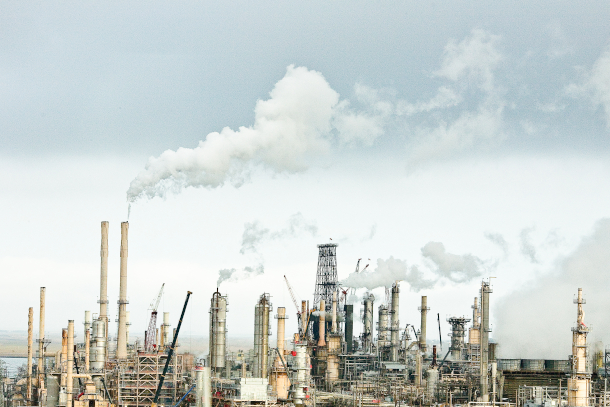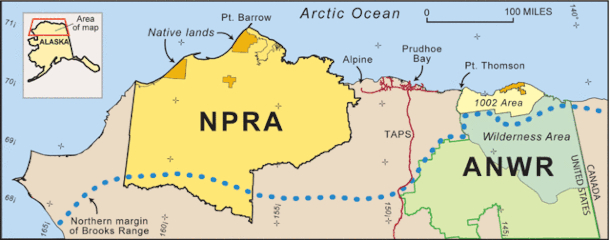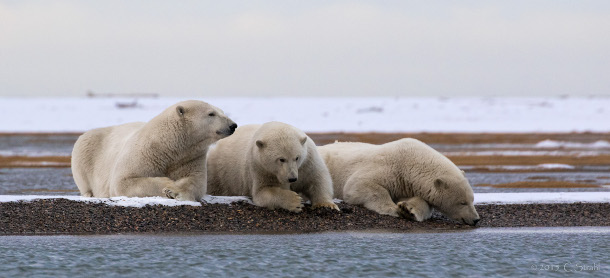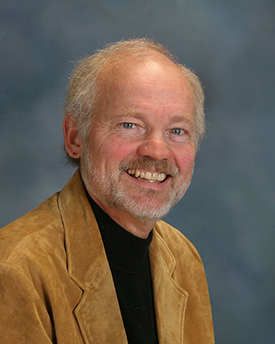A Block on Oil Drilling in Alaska
Air Date: Week of August 27, 2021

A ConocoPhillips oil refinery in California in 2008. At its peak, this refinery can produce over 100,000 barrels of oil every day. (Photo: Thomas Hawk, Flickr CC BY-NC 2.0)
A major Alaska drilling project to tap 600-million-barrels of oil has been blocked. A federal judge ruled in favor of Indigenous and environmental groups, finding that the permitting process has yet to fully consider impacts on the climate and polar bears. Both the Trump and Biden Administrations have backed this ConocoPhillips project, and to explain why, Host Jenni Doering speaks with Pat Parenteau of Vermont Law School.
Transcript
O’NEILL: From PRX and the Jennifer and Ted Stanley Studios at the University of Massachusetts Boston, this is Living on Earth. I’m Aynsley O’Neill.
DOERING: And I’m Jenni Doering.
A major Alaska drilling project that would tap into 600-million-barrels of oil has been put on hold by a federal judge. The Willow project in the National Petroleum Reserve would produce as much as 160,000 barrels a day for ConocoPhillips and had the support of both the Trump and Biden Administrations. Judge Sharon Gleason of the U.S. District Court ruled in favor of Indigenous and environmental groups, finding that the permitting process failed to fully consider the impacts on the climate and polar bears. For more I’m joined by Pat Parenteau, professor of environmental law at Vermont Law School. Welcome back to Living on Earth, Pat!
PARENTEAU: Thanks, Jenni, good to be with you.
DOERING: Yeah, so how big of a setback is this decision for the Willow project?
PARENTEAU: Well, these are procedural rulings, right? I mean, the judges didn't say 'you can't drill', she really doesn't have the power to do that. But you know, they're the kinds of rulings that will take a long time for the Department of Interior to fix. You can imagine this challenge of having to actually quantify how much additional carbon is going to result from this leasing of this area in Alaska. It's a really complicated thing, it's going to take some time to do that. The consideration of alternatives isn't going to, I don't think consume a lot of time, but it will take some time. When you go back to correct errors in these environmental impact statements, you have to go back through the same process that you did when you adopted the EIS, which means an opportunity for public comment. And you know, this area we're talking about is the homeland of the Inupiat people, several tribes with certain claims that have to be respected. And the Biden administration, of course, has made a big point with environmental justice. So that's going to take some time. And then finally, the Endangered Species Act, that's got to go back through another round of what's called consultation. And what the court said is, if you're going to say that impacts on the polar bear and its habitat, this is areas where the polar bear dens, so if you're going to have impacts, and you say you're going to mitigate them, you have to demonstrate not only how you're going to mitigate them, but what requires the mitigation. How will the mitigation actually be enforced? And if it doesn't work the way you thought, how are you going to correct for that? So my estimation is, if this decision is not overturned by the Ninth Circuit, it's going to take more than a year to go back through all of this review and assessment and outreach before they could move forward again.

Map of northern Alaska showing location of the National Petroleum Reserve-Alaska, where the Willow Project would be developed, and the Arctic National Wildlife Refuge. (Photo:USGS)
DOERING: Wow, and so to what extent is this just a matter of documenting the possible impacts of this project and then moving forward with the same plans? Or do you think they might actually have to change the project scope a little bit here?
PARENTEAU: I think they might have to change certainly the footprint on the ground. I think the judge's ruling is basically saying you didn't work very hard to limit the environmental impacts from this drilling activity. So I'm not sure that it would shrink the amount of area that has been leased. But it's certainly going to have an impact on how the project is configured. And of course, it does give the Biden administration the opportunity to take a second look at this, and maybe decide that this amount of leasing or this amount of production isn't justified. I think that's a long shot, you know, this area was set up to be developed. Obviously, there's tremendous political support within Alaska for this development. We talked on another show about how the Biden administration has taken a harder line on drilling in the ANWR, the Arctic National Wildlife Refuge. So I think it's very unlikely, honestly, that the Biden administration is going to cancel these leases. That, among other things, that would cost a lot of money. So I think this leasing actually is probably going to go forward, maybe in a way that has a less impact on this sort of sensitive Alaskan area.
DOERING: Now, as you mentioned, the company can appeal this decision up to the Ninth Circuit. In that case, what do you think we might see?
PARENTEAU: That's going to be an interesting challenge for the Biden administration. The administration could basically agree with the lower court and not appeal and say we're going to embark on a new EIS and a new review. I think, frankly, that's a good chance that the Biden administration will do that. Conoco then can try to take its own appeal. That's a complicated legal question where the federal government is the one that has the responsibility to comply with NEPA, the National Environmental Policy Act. There is some judicial decisions that suggest where the government has confessed error, the third party, here Conoco, doesn't have standing to challenge that. So that would be another, to lawyers anyway, interesting question of would the Ninth Circuit entertain a challenge to the lower court's decision where the Biden administration was not challenging it. That will be an interesting thing to watch.

In addition to the threats to Indigenous communities and the climate, the ConocoPhillips Willow project is also likely to impact the breeding grounds of the local polar bear population. (Photo:Cheryl Strahl, Flickr CC BY-NC 2.0)
DOERING: You know, in May the Biden administration threw its support behind the Willow project, despite blocking other oil and gas activity nearby in ANWR, the Arctic National Wildlife Refuge. So what's the bigger picture here? And what's the administration's strategy on oil and gas leasing on federal lands?
PARENTEAU: I think the administration is sincere in saying it wants to wind down oil and gas leasing. I think that President Biden during the campaign probably exaggerated when he said he was going to end, you know. First he said, he was going to end all fracking and then he backed off and said he's at least going to end oil and gas on public lands. He's finding out of course, that that's more difficult to do than he thought. So I would not expect to see a sudden stop to oil and gas leasing. There are legitimate legal questions about how far and how fast the Biden administration can go in quote, ending oil and gas development, even on federal land, and in offshore waters, like the Gulf of Mexico and others. So what I would say is, is people have to temper their expectations about how quickly we're going to see an end to oil and gas leasing. That isn't to say, people shouldn't keep putting the pressure on, because I know they will. But I think it's probably unrealistic to expect that the administration will just announce tomorrow, no more oil and gas leasing anywhere, that's not going to happen. But I do see the curve of oil and gas production from federal land and federal water bending down. And certainly, if the administration is going to meet its targets, you know, of a electricity or an energy sector, that's carbon neutral by something like 2035 or 2040, even, they're going to have to severely curtail oil and gas development. And then, of course, as that happens, we'll have to see what Congress's response is. Not only the Congress we have today, but the Congress we're going to have after the midterm elections, and of course, ultimately in 2024.
With the recent court decision about the Willow Master Development Plan, Bureau of Land Management has a chance to actually listen to Nuiqsut residents when ConocoPhillips applies again.#SilaInuat #Inupiaq #IndigenousVoices #StopArcticOilExtraction #BuildBackFossilFree pic.twitter.com/4uWHpD1ps1
— silainuat (@silainuat) August 25, 2021
DOERING: Now, back in June, Pat, you and I had a chance to talk about this judge in Louisiana, who blocked the Biden administration's attempts to pause oil and gas leasing on federal lands and waters. And the judge basically said that it needed to go ahead and hold those lease sales. What's the status of that decision, and how is the administration responding now?
PARENTEAU: Yeah, the administration is being rather coy, is the word I would use, in response. They're saying on the one hand, we intend to comply with the judge's order.. Secretary Haaland has promised to deliver to Congress and basically to the public. A report on this review that President Biden had ordered of the oil and gas program, we haven't seen that report. It's being promised sort of virtually any day. We know that this report is going to contain proposed revisions to the oil and gas leasing program, for example, it's going to require a lot more rigorous analysis of the climate effects of all this leasing. It's going to require imposing what's called the social cost of carbon in the analysis of whether further leasing is justified. It's going to increase the amount of royalties that have to be paid for these oil and gas leases. So all of that is pointing to the in the direction of less, not more leasing. We haven't seen that report.

Former EPA Regional Counsel Pat Parenteau teaches environmental law at Vermont Law School. (Photo: Courtesy of Vermont Law School)
In the meantime, the Department of Justice just announced, not surprisingly, that it is appealing the district judge's decision from Louisiana to the Fifth Circuit Court of Appeals. So it could very well go all the way to the Supreme Court. Some court is going to have to resolve what is the administration's obligation to continue a leasing program, at what level and with what restrictions and so on and so forth. Another really interesting area where we're going to have to wait a while to see how, as we say in Vermont, how some of this sugars off in the courts.
DOERING: Pat Parenteau is a professor of environmental law at Vermont Law School. Thanks so much, Pat.
PARENTEAU: You're very welcome, Jenni.
DOERING: As we are going to air, the Department of Justice has announced a plan to hold the Biden Administration’s first oil and gas lease sale later this year. In a statement, the Interior department said it will quote, "conduct leasing in a manner that fulfills Interior’s legal responsibilities, including to take into account the programs’ documented deficiencies". So, the Biden administration is moving forward with lease sales but they continue to fight the Louisiana ruling that requires them in court.
Links
E&E News | “Court Axes Permits for Massive Alaska Oil Project Backed by Biden”
Click to hear our last story on Judge Gleason and oil leasing in ANWR
E&E News | “Interior Announces First Oil Drilling Sales of the Biden Era”
Living on Earth wants to hear from you!
Living on Earth
62 Calef Highway, Suite 212
Lee, NH 03861
Telephone: 617-287-4121
E-mail: comments@loe.org
Newsletter [Click here]
Donate to Living on Earth!
Living on Earth is an independent media program and relies entirely on contributions from listeners and institutions supporting public service. Please donate now to preserve an independent environmental voice.
NewsletterLiving on Earth offers a weekly delivery of the show's rundown to your mailbox. Sign up for our newsletter today!
 Sailors For The Sea: Be the change you want to sea.
Sailors For The Sea: Be the change you want to sea.
 The Grantham Foundation for the Protection of the Environment: Committed to protecting and improving the health of the global environment.
The Grantham Foundation for the Protection of the Environment: Committed to protecting and improving the health of the global environment.
 Contribute to Living on Earth and receive, as our gift to you, an archival print of one of Mark Seth Lender's extraordinary wildlife photographs. Follow the link to see Mark's current collection of photographs.
Contribute to Living on Earth and receive, as our gift to you, an archival print of one of Mark Seth Lender's extraordinary wildlife photographs. Follow the link to see Mark's current collection of photographs.
 Buy a signed copy of Mark Seth Lender's book Smeagull the Seagull & support Living on Earth
Buy a signed copy of Mark Seth Lender's book Smeagull the Seagull & support Living on Earth

